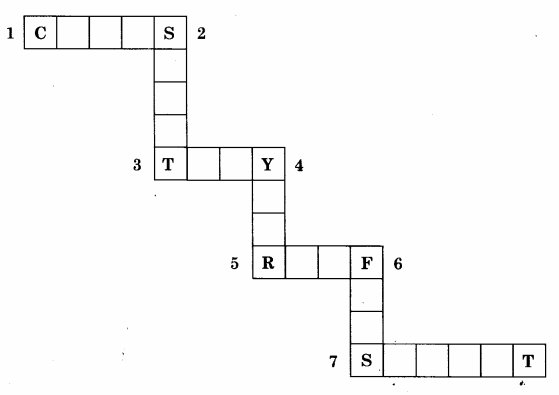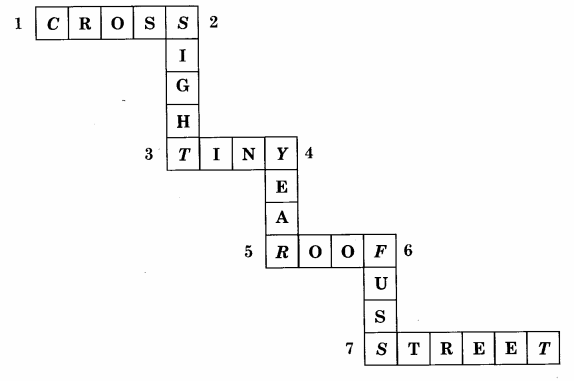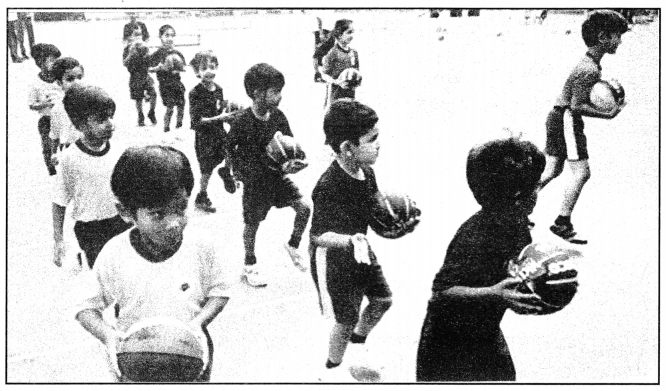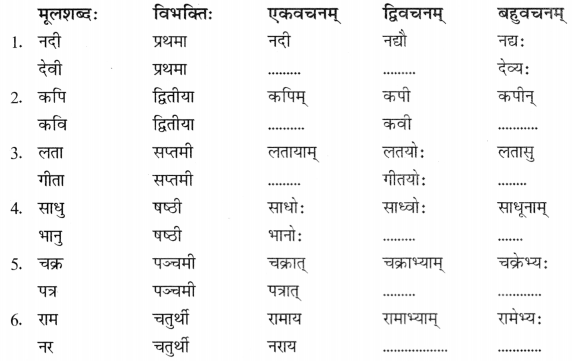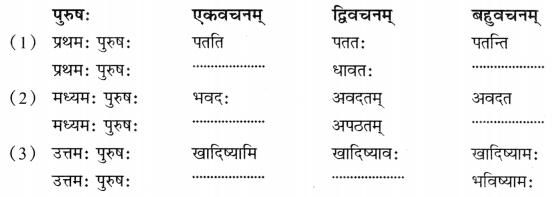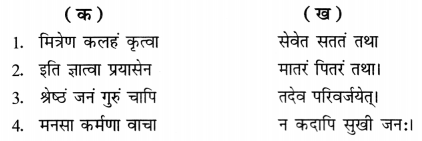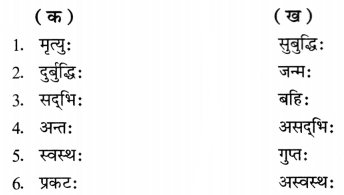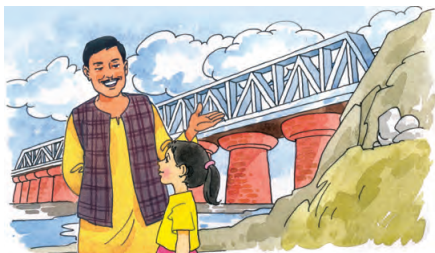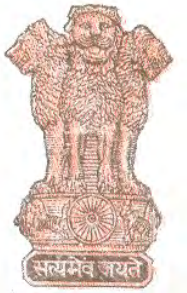NCERT Solutions for Class 7 English Honeycomb Chapter 1 Three Questions are part of NCERT Solutions for Class 7 English. Here we have given NCERT Solutions for Class 7 English Honeycomb Chapter 1 Three Questions.
| Board | CBSE |
| Textbook | NCERT |
| Class | Class 7 |
| Subject | English Honeycomb |
| Chapter | Chapter 1 |
| Chapter Name | Three Questions |
| Number of Questions Solved | 47 |
| Category | NCERT Solutions |
NCERT Solutions for Class 7 English Honeycomb Chapter 1 Three Questions
IMPORTANT PASSAGES FOR COMPREHENSION
Read the following extracts and answer the questions that follow by choosing the correct option :
[I]
Question 1.
Many wise men came to the king, but they all answered his questions differently. The king gave no reward. (Page 7)
Multiple Choice Questions
Question 1.
The wise men wished to get
(a) some amount of money
(b) a handsome sum of money
(c) the land owned by the king
(d) the treasure buried under the temple
Answer.
(b) a handsome sum of money
Question 2.
Their answers to his questions were
(a) inappropriate
(b) different
(c) irrelevant
(d) to the point
Answer.
(b) different
Question 3.
The king’s reaction was
(a) undesirable
(b) humiliating
(c) justified
(d) instant
Answer.
(c) justified
Question 2.
“You are tired,” said the king. “Let me take the spade and work in your place.” (Page 9)
Question 1.
Who is ‘you’ in the above extract ?
Answer.
‘You’refers to the hermit.
Question 2.
Why did the king offer to work ?
Answer.
The king offered to work because he felt that the hermit was very tired.
Question 3.
What does it show about the king’s character ?
Answer.
It shows the king’s compassion.
Question 3.
“Here comes someone running, said the hermit.” (Page 10)
Multiple Choice Questions
Question 1.
The hermit drew the king’s attention
(a) to the axe kept nearby
(b) towards the bearded man
(c) towards the evil bodyguard
(d) to the seeds to be sown
Answer.
(b) towards the bearded man
Question 2.
The bearded man was
(a) stabbed by the king
(b) God-fearing
(c) the king’s enemy
(d) wearing a long robe
Answer.
(c) the king’s enemy
Question 3.
Both the hermit and the king
(a) slept for long
(b) nursed the wounds of the bearded man
(c) told tales
(d) were not surprized to meet the man
Answer.
(b) nursed the wounds of the bearded man
[II]
Question 4.
“Now if I live, I will serve you as your most faithful servant and will order my sons to do the same. Forgive me !” (page 12)
Question 1.
Who is the speaker of the above lines ?
Answer.
The speaker was an injured bearded man whom the king had helped. The king had saved his life.
Question 2.
Who was he speaking to ?
Answer.
He was speaking to the king.
Question 3.
Why was he making such a promise ?
Answer.
He felt greatly indebted to the king. In order to repay the king’s goodness, he was making that promise.
Question 5.
The most important business is to do that person good, because we were sent into this world for that purpose alone. (Page 13)
Question 1.
The hermit’s advice was
(a) to do good to the people
(b) to do important work
(c) to do hard work
(d) to do good to the person who needs your help at the moment
Answer.
(d) to do good to the person who needs your help at the moment
Question 2.
No one is sure
(a) if he would get time to meet someone else
(b) if he will live
(c) what is in store for him
(d) whether the future is bright for him
Answer.
(a) if he would get time to meet someone else
Question 3.
To do good is
(a) the only work for you
(b) the main purpose of our life
(c) greatly admired by gods
(d) liked by even the devils
Answer.
(b) the main purpose of our life
TEXTUAL QUESTIONS
Comprehension Check (Page 10)
Question 1.
Why did the king want to know answers to three questions ?
Answer.
The king wanted to be always successful. For this purpose, he wanted to know the answers to three questions.
Question 2.
Messengers were sent throughout the kingdom
(i) to fetch wise men.
(ii) to find answers to the questions.
(iii) to look for the wise hermit.
(iv) to announce a reward for those who could answer the questions.
Mark your choice.
Answer.
(iv) to announce a reward for those who could answer the questions.
Comprehension Check (Page 14)
Complete the following sentences by adding the appropriate parts of the sentences given in the box.
- Many wise men answered the king’s questions, …………..
- Someone suggested that there should be a council of wise men ……………
- Someone else suggested that the king should have a timetable …………..
- The king requested the hermit …………
- The king washed and dressed the bearded man’s wound, ………………

Answers.
- Many wise men answered the king’s questions but their answers were so varied that the king was not satisfied.
- Someone suggested that there should be a council of wise men to help the king act at the right time.
- Someone else suggested that the king should have a timetable and follow it strictly.
- The king requested the hermit o answer three questions.
- The king washed and dressed the bearded man’s wound but the bleeding would not stop.
Answer the following questions :
Question 1.
Why was the king advised to go to magicians ? (Imp.)
Answer.
Some people said that the magicians could look into the future. If one knows the future it is easy to decide the right time for doing something. The king wanted to know the right time to begin something. So some people advised the king to go to magicians.
Question 2.
In answer to the second question, whose advice, did the people say, would be important to the king ?
Answer.
In answer to the second question the wise men had given different answers. Some said that the king’s councillors were the people whose advice was important. Others thought the priests were more important. A few others chose the doctors. Some said that the advice of the soldiers would be important to the king.
The hermit’s answer was the best. He said that the person present with the king was the only important person. His advice would be important.
Question 3.
What suggestions were made in answer to the third question ?
Answer.
In answer to the third question, some said science was the most important affair. Others chose fighting and yet others advocated religious worship.
The hermit’s answer was the best. He said that the most important affair is to do good to the person before you. The hermit believed that man was sent on the earth for this purpose alone.
Question 4.
Did the wise men win the reward ? If not, why not ? (V. Imp.)
Answer.
No, the wise men did not win the reward. It was so because none of their answers could satisfy the king.
Question 5.
How did the king and the hermit help the wounded man ? (V. Imp.)
Answer.
The king and the hermit removed the man’s clothing. They saw that there was a wound in his stomach. The king washed the wound. Then he covered it with his handkerchief. Yet the blood kept on flowing. So the king redressed the wound. At last the bleeding stopped. The man felt better. Now he wanted to drink something. The king gave him fresh water. After this, they carried him into the hut and put him on the bed.
Question 6.
(i) Who was the bearded man ?
(ii) Why did he ask for the king’s forgiveness ?
Answer.
- The bearded man was the king’s sworn enemy. The king had killed his brother and seized his property. He wanted to avenge his murdered brother by killing the king.
- The king had washed the bearded man’s wound. He had covered the wound with his handkerchief. He redressed his wound because the blood kept on flowing. The bearded man felt grateful to the king. Therefore he asked for his forgiveness.
Question 7.
The king forgave the bearded man. What did he do to show his forgiveness ? (Imp.)
Answer.
To show his forgiveness, the king promised to help the bearded man. He promised to send his servants and his own doctor to look after him. The king also promised to give him back his property.
Question 8.
What were the hermit’s answers to the three questions ? Write each answer separately. Which answer do you like most, and why ? (V. Imp.)
Answer.
The hermit’s answer was that ‘Now’ is the best time to begin work. For, nobody knows whether he will have any time in the future or not. The king had just put his questions, when he pitied the hermit. Later on it proved to be the best time. Had he not done so and gone back, his enemy would have killed him.
Answering the second question, the hermit said that the people present were the best. They alone should be listened to. For, these are the only people whom one can consult at once.
To do good to the people present is the most important thing. It was the hermit’s reply to the third question. According to the hermit, man was sent on the earth for this purpose alone.
I like the answer to the first question most. It is most logical.
Working with Language
Question 1.
Match items in List A with their meanings in List B.
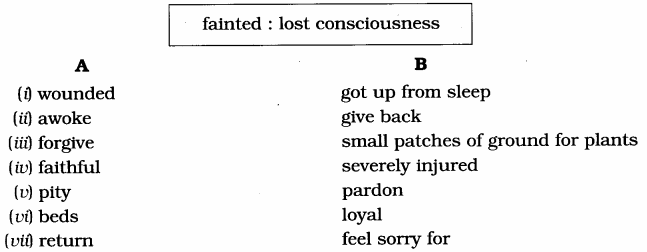
Use any three of the above words change the form of the word.
Answer.
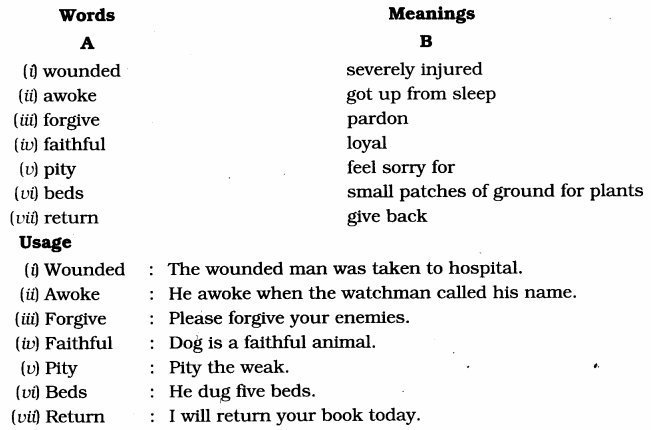
Question 2.
Each of the following sentences has two blanks. Fill in the blanks with appropriate forms of the word given in brackets. (Imp.)
He has ………. to help me. Do you think he will remember his ……. ? (promise)
He has promised to help me. Do you think he will remember his promise ?
(i) The ……….. said that only fresh evidence would make him change his ……. (judge)
(ii) I didn’t notice any serious ……….. of opinion among the debaters, although they ………. from one another over small points. (differ)
(iii) It’s a fairly simple question to ……….. , but will you accept my …….. as final ? (answer)
(iv) It isn’t ……… that …………… should always be the mother of invention. (necessary)
(v) Hermits are ………. men. How they acquire their ………… no one can tell. (wise)
(vi) The committee ………….. has to make Jagdish captain of the team. The ……….. is likely to please everyone. (decide)
(vii) Asking for ………. is as noble as willingness to …………. . (forgive)
Answers.
- The judge said that only fresh evidence would make him change his judgement.
- I didn’t notice any serious difference of opinion among the debaters, although they differed from one another over small points.
- It’s a fairly simple question to answer, but will you accept my answer as final?
- It isn’t necessary that necessity should always be the mother of invention.
- Hermits are wise men. How they acquire their wisdom no one can tell.
- The committee has decided to make Jagdish captain of the team. The decision is likely to please everyone.
- Asking for forgiveness is as noble as willingness to forgive.
Speaking and Writing
Question 1.
Imagine you are the king. Narrate the incident of your meeting the hermit. Begin like this :
The wise men answered my questions, but I was not
satisfied with their answers. One day I decided to go
and meet the hermit…
Answer.
… I put on ordinary clothes. I started for the woods, in which the hermit lived. I left my horse with my bodyguard. Then, I went to the hermit’s hut alone. I saw the hermit digging the ground. The hermit greeted me but continued digging. I told him the purpose of my visit. The hermit listened to me. Without speaking anything he busied himself again in digging. I felt the hermit was tired. I offered to do his work for him. He agreed, I began to dig the ground.
Question 2.
Imagine you are the hermit. Write briefly the incident of your meeting the king. Begin like this : (Imp.)
One day I was digging in my garden. A man in
ordinary clothes came to see me. I knew it was the
king …
Answer.
I greeted the king. He asked me three questions. He wanted to know the right time to do the right thing. He wanted to know who were the people he needed most. He also wanted to know the affairs which were most important. I made no reply. Then the king saw that I was tired. He offered to do my work. I gave him my spade. He worked till sunset.
SHORT ANSWER TYPE QUESTIONS
Question 1.
Why was the king anxious to know the answers to his questions ?
Answer.
The king wanted to know the answers to his three questions. He felt that if he knew them, he would never fail in his attempts.
Question 2.
The hermit told the king the purpose of human life. What was it ? What was the king’s aim of life before meeting the hermit ? (V. Imp.)
Answer.
The hermit told the king that the purpose of life was to help others. Success in whatever he did, was the king’s aim of life before meeting the hermit.
Question 3.
Why did the king go alone and in ordinary clothes to meet the hermit ?
Answer.
The king went alone and in ordinary clothes because he knew that the hermit saw no one but simple people.
Question 4.
Why did the king dig the ground ?
Answer.
The king dug the ground to help the hermit.
Question 5.
Why did the hermit let the king work till sunset ?
Answer.
The hermit let the king work till sunset to save his life.
LONG ANSWER TYPE QUESTIONS
Question 1.
What was the hermit’s answer to the second question : ‘Which people should be listened to’ ? Justify the answer. (V. Imp.)
Answer.
The hermit’s answer to the second question was that the king should listen to the people who were with him at that particular moment. It was correct because according to the hermit man’s only duty is to help his fellowmen. So if there is someone before us who needs our help, our foremost duty is to help him.
OBJECTIVE TYPE QUESTIONS
Read the statements given below and choose the correct option :
Question 1.
The answers to the three questions will enable :
(i) the hermit to go to the king
(ii) the king to lead a peaceful life
(iii) the king to be always successful
(iv) the subjects to lead a good life
Answer.
(iii) the king to be always successful
Question 2.
The king was not satisfied with the answers as :
(i) they were lengthy
(ii) they all were different
(iii) they were dull
(iv) they served no purpose
Answer.
(ii) they all were different
Question 3.
The king went to see the hermit in ;
(i) his cage
(ii) simple clothes
(iii) his cave
(iv) a hurry
Answer.
(ii) simple clothes
Question 4.
The king dug the beds
(i) because he loved gardening
(ii) to help the hermit
(iii) to pass time
(iv) to get his answers
Answer.
(ii) to help the hermit
Question 5.
The wounded man was
(i) a friend of the hermit
(ii) a friend of the king
(iii) an enemy of the hermit
(iv) an enemy of the king
Answer.
(iv) an enemy of the king
Question 6.
The king dressed the wounds of :
(i) the hermit
(ii) his guard
(iii) the horse
(iv) the bearded man
Answer.
(iv) the bearded man
Question 7.
The bearded man was the :
(i) relative of the king
(ii) friend of the king
(iii) king’s sworn enemy
(iv) guard of the king
Answer.
(iii) king’s sworn enemy
Question 8.
The bearded man asked for :
(i) water
(ii) property
(iii) forgiveness
(iv) money
Answer.
(iii) forgiveness
Question 9.
The king ‘had done him’ wrong as :
(i) he had killed his brother
(ii) he had killed his sister
(iii) he had seized his property
(iv) Both (i) and (iii)
Answer.
(iv) Both (i) and (iii)
Question 10.
The king sent a/an to look after him.
(i) doctor
(ii) anaesthetic
(iii) quack
(iv) servant
Answer.
(i) doctor
Question 11.
The king was happy that
(i) he had won a friend
(ii) he had killed his enemy
(iii) his action had pleased the hermit
(iv) his enemy was wounded
Answer.
(i) he had won a friend.
Question 12.
The answers of the hermit
(i) satisfied the king
(ii) failed to satisfy the king
(iii) confused the king
(iv) amused the king
Answer.
(i) satisfied the king.
We hope the NCERT Solutions for Class 7 English Honeycomb Chapter 1 Three Questions help you. If you have any query regarding NCERT Solutions for Class 7 English Honeycomb Chapter 1 Three Questions, drop a comment below and we will get back to you at the earliest.


